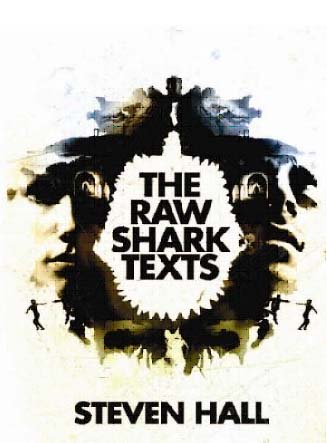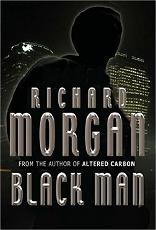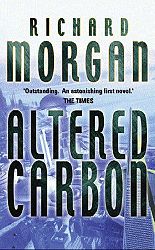O is for Octopus: the A-Z of China Miéville.
science fiction
Your Happening World (16)
Stuff of interest (to me anyway) of Friday 16th April 2010.
- Hal Duncan wants to see more fluffy, entertaining gay movies and fewer serious gay movies. Not one to just moan he has written his own: a revamp of As You Like It as a gay highschool musical.
- Andrew Wheeler has the list of bestselling genre novels of 2009. Quite a lot of shitty sf and fantasy books sold really really well last year.
- “I do not believe that the man possesses so much as a single grain of insight into human character, more than a thumbnail understanding of politics or society, or even a base theoretical comprehension of women and their interior lives. His worldview is customarily infantile, occasionally rising to the level of juvenile. His preoccupations are, therefore, those of infants and juveniles”. Tim O’Neil on the Tao of Miller.
- Personally I liked Miller’s eighties work (Daredevil: Born Again, Batman: Year One, Ronin etc.) because while they were juvenile power fantasies, at least they were juvenile power fantasies in which the hero could break his ribs or get his lungs punctured. That was new back then. Now? Not so much.
-
Imagine this: you’re the sole Dutch survivor of Sobibor, manage to escape the camp with the Polish man you’ve come to love, hide out in the Polish countryside for months, get rescued by the Russians, get married, go back to Holland via the
Meditterraean, lose your baby in the process and when you finally make it back you’re threatened with deportation as an illegal alien! No wonder Selma Wijnberg, having emigrated to the US, refused to visit her home country until only this week, the 65th anniversary of the liberation of Dutch concentration camp Westerbork. - In general, the treatment of Jews during the war is a dark page in Dutch history. Despite early resistance to anti-Jewish measures here, the Netherlands was the Western European country from which the highest percentage of Jews (> 75 %) was deported. Though after the war everybody had been in the resistance all along, plenty of Dutch officials had to cooperate with this deportation to make it that succesful — and quite a few people profited from it. There’s many a house in Amsterdam that’s been acquired through dodgy means during the war.
- On a lighter note: Be A Sex-Writing Strumpet.
The Raw Shark Texts – Steven Hall

The Raw Shark Texts
Steven Hall
427 pages
published in 2007
The Raw Shark Texts was marked as science fiction in my local library, which is why I glanced at it while browsing the fiction shelves. “Mindfuck” would be a better classification howeve, one of those books that break down the realities of your world and has you looking for monsters out of the corners of your eye. Reading it on a long, delayed train journey with nothing else to distract me while it was slowly getting dark helped a lot as well.
Steven Hall sucked me in from the first two sentences: “I was unconscious. I’d stopped breathing.” I should quote the first three and a half pages to show how Steven Hall builds up the scene from there, as his hero wakes up in an explosion of coughs and deep breaths, takes stock of his situation and then realises he doesn’t know where he is or who he is. He pats his pockets, locates a driver’s licence and tastes the name it gives him: Eric Sanderson. The scene ends with that discovery, with a new scene opening in a therapist’s sitting room, as she explains what’s been happening to him. While she explains, flashbacks explains how Eric got there: going downstairs from the bedroom he awoke in, he found a letter by the telephone, a letter from “the first Eric Sanderson”: who tells him to go to this therapist.
Black Man – Richard Morgan

Black Man
Richard Morgan
630 pages
published in 2007
This was too much of a rerun for me. Black Man (published in the US as Thirteen for obvious reasons) has much the same plot as Morgan’s first novel Altered Carbon. A worldweary, cynical but ubercompetent mercenary is blackmailed into going after a murderer and in the process uncovers a far greater and more horrible truth than he suspected existed or his employers necessarily wanted him to find out. As with every Morgan novel I’ve read so far it’s an edge of your seat thriller, keeps you engaged to the bitter end, but five minutes later you’re thinking “that’s all“? I got the feeling Morgan was going through the motions, his heart not in it and it just seemed too slight to be worth a Clarke Award.
One big reason for the discomfort I felt was the silly worldbuilding. Morgan is excellent at creating a “realistic” sounding world, using infodumps, incluing and jargon to create an image in his readers’ heads, but it doesn’t work when he bases his future on the infamous Jesusland map. Remember 2006, after Bush had started his second (stolen) term and before the Congressional midterm elections, and how many of the liberal leaning blogs were despairing of their country? How it really seemed for a moment the US was split in two, with progressive coasts and an ignorant flyover country? Yeah? Remember also how fast that changed once the Democrats actually won an election? Well, it’s this that Morgan bases his future on: the Jesusland maps and books like Thomas Frank’s What’s the Matter with Kansas. It was already dated when he was writing it, now just feels hopelessly silly. It makes it hard to take the world Morgan created seriously.
Altered Carbon – Richard Morgan

Altered Carbon
Richard Morgan
534 pages
published in 2002
Altered Carbon is Richard Morgan’s first novel. It made a strong impression, winning the Philip K. Dick Prize for best novel in 2003, as well as being optioned by Joel Silver, the sale of the movie rights enabling Morgan to become a fulltime writer. Since then Morgan has written several more novels, part of the same generation of British science fiction writers as Alastair Reynolds, Neal Asher and Jon Courtenay Grimwood. I knew of him, but had not read anything of his until last year, when I read Broken Angels and was sucked in from the first page. So not for the first time I started a series in the wrong way, as that was actually the sequel to this book — not that it mattered, as all they shared was the hero, Takeshi Kovacs.
Whereas Broken Angels was a Dirty Dozen type war romp with the cynicsm turned up to eleven, Altered Carbon is more of a Chandleresque film noir story. It starts with Takeshi as amercenary on Harlan’s World being caught and killed in a police dragnet, to wake up on Earth minus one partner and forced to solve the murder of Laurens Bancroft, which everybody but the murder victim in question thinks is suicide. If Takeshi refuses to cooperate or fails in his task he’ll go back in storage for the next couple of centuries or so.